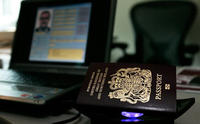-
Canadians outraged: Veiled Muslim women not required to lift veil, prove ID at airports

Canadian airport security personnel do not ask veiled Muslims women to lift their veils, show and ID, and prove their identity; the veiled women do not even interact with security personnel: rather, a man traveling with the women typically hands in all the passports and is the only one to communicate with airline staff while the veiled women simply walk through, unchecked and unidentified; a video showing two veiled women walking unchecked through security at Montreal’s Trudeau International Airport causes outrage in Canada
-
-
New identity theft scheme: stealing kids' Social Security numbers
The latest identity theft scheme: stealing kids’ Social Security numbers years before these kids grow up to use these numbers; the scheme allows people to establish phony credit and run up huge debts — debts that the kids may never be able to pay off
-
-
Secure Communities to have greater impact than Arizona immigration law
Since 27 October 2008 through the end of May 2010, almost 2.6 million people have been screened with Secure Communities; of those, almost 35,000 were identified as illegal immigrants previously arrested or convicted for the most serious crimes, including murder and rape; more than 205,000 who were identified as illegal immigrants had arrest records for less serious crimes; during an eight-month period between 1 October 2009 to 7 June 2010, ICE figures show that 113,453 foreign nations with criminal records had been deported
-
-
The revival of CLEAR's Registered Traveler program
In 2003, Steven Brill, founder of Court TV and American Lawyer magazine, founded Verified Identity Pass and used it to launch the CLEAR program at Orlando International Airport; the program made it possible for pre-registered travelers to skip security checks at airports; the initial 8,000 travelers enrolled in 2003, and the service would grow to nearly 260,000 paying customers in a matter of five years; CLEAR went belly up in 2009, and its assets were bought by Algood Holdings, which relaunched the program; “Same brand, same logo, different company,” says CEO Caryn Seidman Becker
-
-
U.K. removes lead contractor Raytheon from e-Borders program

The U.K. hits out at Raytheon, removing the company from the £1.2 billion e-Borders program; the immigration minister Damian Green said earlier today that the program was running at least twelve months late and that Raytheon had been in breach of contract since July last year; Home Office says it has “no confidence” in the company; Raytheon was the lead contractor of the Trusted Borders consortium, which won a £650 million deal in 2007 to build the e-Borders system; other members of the consortium, including Serco, Detica, Accenture, and Qinetiq will keep their contracts; Raytheon was responsible for systems integration, travel services, and overall project management
-
-
Facial-recognition solution offers surveillance new edge
When the new facial-recognition solution finds a match in a database for someone who may be on a watch list, the client may be notified in multiple ways, including text message or e-mail alerts; biographical information such as criminal records are added and the images and made available to the client from any Web browser, including Web-ready mobile phones
-
-
Immigration control at Welsh ports "risks U.K. security"
Immigration control at some of Wales’s ports is “limited” and jeopardizing the U.K.’s border security, says a watchdog; Holyhead seaport, for example, has no permanent immigration controls
-
-
Hand-held scanner checks 100 databases -- in one second
Army guards at Fort Sam Houston are using a hand-held identity detector that taps information from more than 100 databases — in one second; the manufacturer says that the use of the device has resulted in 60,000 arrests since the start of 2004; Senator Schumer wants TSA to use the device at airports
-
-
Europe's first finger-vein biometric ATMs installed in Poland
Poland claims to be the first European country to install finger-vein biometric ATMs; the authentication system developed by Japanese tech giant Hitachi; unlike fingerprints, which leave a trace and can be potentially reproduced, finger veins are impossible to replicate because they are beneath the surface of the skin
-
-
Florida implements ICE's Secure Communities program
The United States DHS has deported 30,700 illegal aliens with level 1, 2, or 3 crimes in their past; of these, 1,800 illegal aliens have been removed from Florida; as Florida implements the Secure Communities program, the expectation is that the number of deportees will increase
-
-
Omiperception and MaxVision to join forces
Partnership between two companies will enhance marketing offering; ruggedized portable computer adds facial recognition biometrics to allow law enforcement, first responders to collect and process biometric and other relevant in-the-field information
-
-
MorphoTrak receives secure driver license contract award from North Carolina
The $47.5 million contract calls for the company to supply the state with MorphoTrak’s Secure Credentials Center for identity assurance; the company will implement its 3D Photo IDTM technology, which features laser-engraved three dimensional photo-images
-
-
Schlage, Solero Systems form technology partnership
A manufacturer of contactless smart credentials and readers and a developer of identification and access solutions have formed a technology partnership to bring advanced identification and access solutions to customers
-
-
Puerto Rico overhauls birth-certificate systems; will annul 5 million birth certificates

More than 40 percent of all passport fraud cases in the United States start with a stolen Puerto Rican birth certificate; identity thieves have targeted Puerto Ricans because Puerto Rican names provide the perfect cover for Hispanic illegal immigrants entering the United States and are worth as much as $6,000 on the black market; the documents are so valuable that drug addicts trade them for a fix; the Puerto Rican government has decided to change all that: current Puerto Rican birth certificates will no longer be valid after 30 September; between now and then, all Puerto Ricans will have to apply for more secure birth documents
-
-
Obama emphasizes identity management
The Obama administration is planning to promote identity management throughout the government; Howard Schmidt: “The ability to interact with the government in a very secure manner, where privacy and civil liberties are protected and you can only do that with some of the things you look at from an identity management perspective”
-
- All
- Regional
- Water
- Biometrics
- Borders/Immig
- Business
- Cybersecurity
- Detection
- Disasters
- Government
- Infrastructure
- International
- Public health
- Public Safety
- Communication interoperabillity
- Emergency services
- Emergency medical services
- Fire
- First response
- IEDs
- Law Enforcement
- Law Enforcement Technology
- Military technology
- Nonlethal weapons
- Nuclear weapons
- Personal protection equipment
- Police
- Notification /alert systems
- Situational awareness
- Weapons systems
- Sci-Tech
- Sector Reports
- Surveillance
- Transportation
Advertising & Marketing: advertise@newswirepubs.com
Editorial: editor@newswirepubs.com
General: info@newswirepubs.com
2010-2011 © News Wire Publications, LLC News Wire Publications, LLC
220 Old Country Road | Suite 200 | Mineola | New York | 11501
Permissions and Policies
Editorial: editor@newswirepubs.com
General: info@newswirepubs.com
2010-2011 © News Wire Publications, LLC News Wire Publications, LLC
220 Old Country Road | Suite 200 | Mineola | New York | 11501
Permissions and Policies
